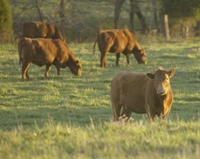Kentucky Cattle Programs Benefit Producers, Consumers
Kentucky Cattle Programs Benefit Producers, Consumers

As the market for beef animals and beef products adjusts to national and world concerns about food safety, Kentucky’s cattle producers are continuing innovative efforts to improve management practices and raise high-quality, healthy animals.
Several model programs, supported by a number of industry organizations and funding sources, are benefiting beef producers and consumers alike. An example is the Beef Quality Assurance, or BQA, program.
“BQA is an educational program that’s been ongoing for several years and provides training for cattle producers on handling and vaccinating, and also gives valuable information on issues facing beef producers,” said John Johns, Extension beef cattle specialist in the University of Kentucky College of Agriculture.
BQA, which is supported by UK and the Kentucky Beef Council, integrates a training manual and video into its educational program that offers practical information for managers of both large and small herds.
“Because BQA covers important practices regarding animal health, such as preventing disease and injury in the herd, it’s ultimately a benefit to the people who buy and eat Kentucky beef,” said Patty Scharko, UK Extension ruminant veterinarian.
BQA has an added incentive for producers. They now must be BQA certified in order to participate in the Master Cattlemen program and also Kentucky’s Certified Preconditioned for Health, or CPH-45, program.
“The CPH program has been operating for many years and it basically requires a certain health standard for calves sold through the program, such as proper weaning and immunizations,” said Roy Burris, UK Extension beef cattle specialist. “Producers benefit from being involved because calves sold under the CPH-45 program typically bring a much better price at the market.”
Calves sold under CPH are tagged for identification and graded by breed in order to create large lots of healthy, uniform calves. Health records assure the proper vaccination of the animals and build confidence among potential buyers.
Through the Kentucky Beef Network, regional KBN facilitators work with local producers to help improve profitability through one-on-one education and assistance. Established with funds from the Agricultural Development Board, KBN is supported by the Kentucky Cattlemen’s Association, the Kentucky Department of Agriculture, Kentucky Farm Bureau, Kentucky Livestock Marketing Association, Kentucky Veterinary Medical Association, and UK’s Cooperative Extension Service.
“The KBN facilitators work closely with Extension, and in fact a lot of our Extension agents get valuable support from the facilitators in terms of on-farm visits and other support activities with local Extension clients,” said Johns.
Another program that emphasizes the importance of identification and tracking is the Five-State Beef Initiative started in 2001 in Kentucky, Illinois, Indiana, Michigan and Ohio. The system is designed to give feedback to producers from the time a beef animal leaves the farm until it is slaughtered.
“The five-state initiative is for producers who are interested in targeting their cattle toward premium markets and who are willing to make the necessary management changes,” said Lee Meyer, UK Extension livestock marketing specialist. “The confidential information obtained through the program not only ensures high-quality beef, but also is used to improve marketing practices in the future.”
Several hundred producers have so far participated in the initiative.
“And during the three years it’s been operating we’ve been able to track literally thousands of cattle and get data back on them,” said Johns.
As USDA funding for the Five-State Initiative winds down, a similar Kentucky-based program funded through Kentucky’s Agricultural Development Board will be implemented.
“This new value-added targeted marketing program, which is a cooperative effort between UK and the Kentucky Beef Network, will assist in obtaining specific data from the feed yard and packer, and beginning to gather this information now in advance of any possible national programs could reap some real benefits for Kentucky cattlemen,” said Jim Akers, coordinator of the beef cattle Integrated Resource Management (IRM) program.
Commercial or purebred cattle producers interested in more information on BQA, CPH-45, Master Cattlemen or other educational programs should contact their county’s UK Cooperative Extension office.
